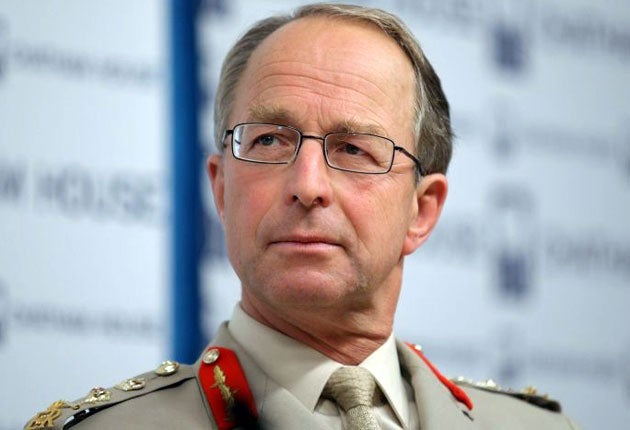Support the Afghan war, says Army chief

The head of the British Army says the war in Afghanistan will become "unsustainable" unless it has support back home, and more must be done to make up for past failures to persuade the public of the justification for the mission.
General Sir David Richards told The Independent: “The irony is that while the Army has huge popular support from the nation, for which we are immensely grateful, the war we are fighting on the nation’s behalf does not benefit from the same support.”
However he insisted that with the decision by Barrack Obama to send 30,000 more troops, “success has become much more attainable” and that it is imperative to “stay the course”.
The Independent has highlighted how senior military commanders are deeply concerned that rising defeatism at home puts Britain in danger of losing its way in Afghanistan with frontline troops becoming demoralised.
General Richards said: “There is a risk in this... My soldiers are an intelligent lot. They know this is unsustainable over time. At the very moment, on the back of President Obama’s decision, that success becomes much more attainable the last thing they want is for the public at home to go wobbly on them. We know this thing is doable and we must help persuade others of it.
“We have not made enough effort over the last few years to explain what we are doing and why we must succeed. From the Prime Minister down, we are making big efforts now to learn this lesson and I sense the tide may just be turning back in the right direction.”
Sir David, the Chief of General Staff, spoke as the conflict reaches a seminal stage with a number of major military operations being planned by American, British and other Nato forces. At the same time there has been increased opposition in the West, especially after the allegations of massive fraud in the election which got President Hamid Karzai back to power.
General Richards acknowledged that there had been an “enduring weakness” of the West in Afghanistan, civilian and military, in “turning all the good ideas into effective, timely action on the ground” in a complex situation. But he stressed that General Stanley McChrystal, the US commander of Nato forces in the country, is urgently addressing the problem.
Gen Richards added: “I also anticipate President Karzai responding to the need, that he acknowledges, to improve governance and root out corruption but with much more substantial focus on the local level.”
As well as reinforcements from the US, around 500 more troops are coming from Britain, and President Obama has demanded a force of up to 10,000 more from other Nato countries.
General Richards, who had long advocated more “boots on the ground” to enable the international forces to live and work among the Afghan people – the policy being adopted now – maintained that the benefits of having the extra troops would be apparent in the next six months.
He said: “The first and most important result of President Obama and the Prime Minister’s decision will be the psychological shock it will deliver to the Taliban. They thought they had persuaded us all that our defeat was in the offing. This is not so, indeed it’s just the opposite. This will take the stuffing out of them psychologically and the new troops will then allow us to exploit this physically.
“The importance of what we are doing has been unequivocally confirmed and the campaign put on the path to a stabilised Afghanistan… able to contain any lingering insurgency, pursuing its legitimate political and economic goals all underpinned by its traditionally moderate Islamic culture. I anticipate the new troops having a tangible effect from late Spring/early Summer 2010.”
Some of the other ideas put forward by Gen Richards, when he was head of the Nato mission in Afghanistan, are now being put into practice. A body for coordinating the civilian and military effort, the Policy Action Group (PAG), which he organized, and was later abandoned is now likely to reappear under another name.
Gen Richards said: “While I regret that the kind of formula we devised in 2006 was not embraced more full-bloodedly earlier, we live in a world as it is, and not one we might wish it to be.
“What Gen McChrystal has done is re-focus and re-energise ISAF’s efforts on the key things, providing that understanding and leadership that outstanding commanders like him bring to the party. I know that General McChrystal is fully briefed on PAG and am 100 per cent confident that he will solve this enduring conundrum of putting plans into action. He is also being supported by a superb team with men such as [the British ] Lieutenant General Nick Parker behind him.”
Gen Richards said the strategy now would be to secure areas; to use special forces and other military elements to keep hitting Taliban strongholds; allow those insurgents, including the leadership, who wants to reintegrate into society to do so; and the rapid expansion of Afghan security forces.
“While we can expect to see reduced levels of violence as the impact of enhanced Afghan security forces numbers starts to be felt militarily, and on the confidence of the local population and Taliban in different ways respectively, we should nevertheless expect to be there for some years yet. Our role will increasingly morph into a supporting one. The key point is that the Afghan people know we will not let them down and that the Taliban and al-Qa’ida know we have the stomach to face them down; and that we have the collective resolve to succeed. Then by 2013 and 14, I am confident that all this can result in a stabilised Afghanistan and region.”
Join our commenting forum
Join thought-provoking conversations, follow other Independent readers and see their replies
Comments
Bookmark popover
Removed from bookmarks